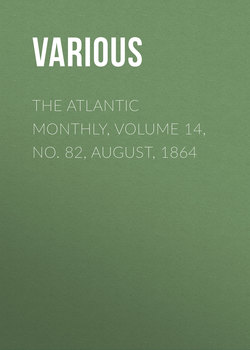The Atlantic Monthly, Volume 14, No. 82, August, 1864

Реклама. ООО «ЛитРес», ИНН: 7719571260.
Оглавление
Various. The Atlantic Monthly, Volume 14, No. 82, August, 1864
CHARLES READE
HOW ROME IS GOVERNED
CONCORD
MAY 23, 1864
WHAT WILL BECOME OF THEM?
PART I
HEAD-QUARTERS OF BEER-DRINKING
FRIAR JEROME'S BEAUTIFUL BOOK
LITERARY LIFE IN PARIS
PART I
THE LITTLE COUNTRY-GIRL
CHAPTER I
CHAPTER II
CHAPTER III
SWEET-BRIER
HOUSE AND HOME PAPERS
VIII. ECONOMY
THE HEART OF THE WAR
OUR RECENT FOREIGN RELATIONS
REVIEWS AND LITERARY NOTICES
Отрывок из книги
There are a thousand descriptions of Rome, its antiquities, galleries, ceremonies, and manners, but hardly any, that I remember, of the organization of the Papal Government,—that wonderful power which long played the chief part in the social and political revolutions of Europe, which, even in its decay, preserves so much of its original grandeur, and still clings to its traditions with a tenacity of conviction that commands our respect, although the remembrance of the evil that it has done compels us, as men and as Christians, to rejoice at the prospect of its fall.
This omission on the part of so many thoughtful travellers is by no means an unnatural one. We go to Rome in order to see and to feel, rather than to study and to think. The past crowds upon us overladen with history and poetry; and the present is so full of new forms of life that it is only when we come to sit down at a distance and gather up our recollections that we ask ourselves how all the instruments of that gorgeous pageantry are put together and moved. The Pope has palaces and villas. The cardinals live in splendid apartments, and ride in massive coaches of purple and gilt, drawn by horses richly caparisoned, and attended by servants in livery. Bishops and prelates and monks and priests and friars fill long processions on public occasions, and move about in their daily life with the air and bearing of men who belong to a sphere that common men have no concern in.
.....
But the Inquisition, you say, is no longer the Inquisition of three hundred years ago. Bunyan tells us that Christian, on his pilgrimage to the Celestial City, saw, among other memorable sights, a cave hard by the way-side, wherein sat an old man, grinning at pilgrims as they passed by, and biting his nails because he could not get at them. And now let me tell you a story of the Inquisition which I know to be true.
Some twenty-five years ago there lived in Rome a physician well known for his professional skill, and still better for his good companionship and ready wit. He was, in fact, a pleasant companion, fond of a good story, fonder still of his dog and gun, fondest of all of talking about poetry and reciting verses, which he could do by the hour,—sometimes repeating whole pages from Dante or Petrarch or Tasso or his favorite of all, Alfieri,—and sometimes extemporizing sonnets, or terzine, or odes, with that wonderful facility which Nature has given to the Italian improvvisatore and denied to the rest of mankind. It has often been remarked that the study of medicine goes hand in hand with a certain boldness of speculation not altogether in harmony with the lessons of the priest. No one who has lived in Italy long enough to get at the true character of the people can have failed to observe this in Italian physicians; and our doctor, like many of his brethren, was suspected of carrying his speculations into forbidden fields. Still, his practice was large, and went on increasing. Laymen, if they must needs be sick, were glad to have him at their bedsides; and there were even men with purple on their shoulders who had strong faith in his skill, if they had strong doubts of his orthodoxy. Externally he conformed to the requirements of the Church: heard mass of Sundays, and went once a year to the confessional; for this much is a police regulation, a tax upon conscience which every Roman is bound to pay. But he was too much behind the scenes to do it with a good will, and saw professionally too much of the daily life of the clergy, looked too freely and too closely at some of their "pleasant vices," to feel much reverence either for them or for their teachings.
.....